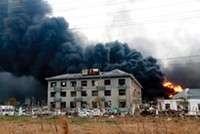Advertisement
Grab your lab coat. Let's get started
Welcome!
Welcome!
Create an account below to get 6 C&EN articles per month, receive newsletters and more - all free.
It seems this is your first time logging in online. Please enter the following information to continue.
As an ACS member you automatically get access to this site. All we need is few more details to create your reading experience.
Not you? Sign in with a different account.
Not you? Sign in with a different account.
ERROR 1
ERROR 1
ERROR 2
ERROR 2
ERROR 2
ERROR 2
ERROR 2
Password and Confirm password must match.
If you have an ACS member number, please enter it here so we can link this account to your membership. (optional)
ERROR 2
ACS values your privacy. By submitting your information, you are gaining access to C&EN and subscribing to our weekly newsletter. We use the information you provide to make your reading experience better, and we will never sell your data to third party members.
Industrial Safety
ChemChina plant leak is identified as cause of blast that killed 23 in China
Delivery truck was initially blamed as source of the tragedy
by Jean-François Tremblay
December 4, 2018

After some initial confusion, investigators have identified a vinyl chloride leak at a ChemChina facility as the cause of a huge blast that killed 23 in the northern China city of Zhangjiakou. Most victims of the explosion were sitting in trucks that were waiting outside the factory, run by Hebei Shenghua Chemical Industry, a subsidiary of state-owned ChemChina.
“This is a relatively new facility,” says David S. Jiang, president of the Beijing-based chemical industry consulting firm Sinodata, noting that he visited the plant recently.
The Chinese media initially reported that the spontaneous ignition of a truck delivering acetylene to a nearby facility was behind the Nov. 28 disaster. An investigation led by China’s Ministry of Emergency Management later identified the vinyl chloride leak as the cause. Shenghua uses the intermediate to produce polyvinyl chloride.
In a contrite statement on its website, ChemChina said “the occurrence of this accident reflects serious problems in our safety management.”
A committee under the State Council, China’s highest decision-making body, promised to further raise China’s commitment to industrial safety.
The Chinese government had already ratcheted up its supervision of companies that produce or use hazardous goods following a 2015 explosion at a storage facility in Tianjin that killed more than 100 people. The crackdown has led to complaints from chemical producers about excessive red tape.



Join the conversation
Contact the reporter
Submit a Letter to the Editor for publication
Engage with us on Twitter